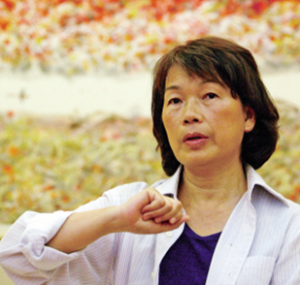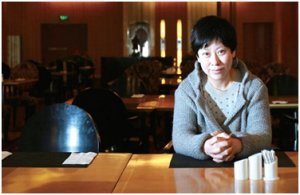Why do we categorize things?
Go into any bookstore and you’ll always see books neatly stacked and displayed under different categorizations—romance, sci-fi, horror, travel, Chinese, English—categorizations so arbitrary and authoritative as if romances don’t happen in 3013 and travelers never accidentally step into a brave new world.
Growing up, I hated those imposed classifications, probably because back then I was writing a love story among aliens and afraid my book would not fit into any categorizations—the first step of becoming a best-seller.
I have a mother from a traditional Chinese family but with an open heart and mind, and a father from the cosmopolitan Taipei City who always looks reserved. Culture has its own way to influence people, whether good or bad, and it’s not our job to tell people what you can benefit from reading what kinds of books.
A lot of people around me who are old and “supposed” to be wise tell me that in a life, you just can’t have it all, and you have a choice to make, as they stare at the English books that have conquered more than half of the available spaces of my bookshelves with the look of patriotic serenity. They ask, “Which one do you value better, which one shall be your direction?” They want me to make a choice and stick to it—English or Chinese? But Why do I have to make a choice?

Lung Yingtai
When I feel the need for some life reflection, I go online and google “Lung Yingtai”. She is this witty, caring, reflective, insightful, middle-aged woman whose prose I’ve grown up hearing, reading, if not memorizing.
I never feel detached or unfamiliar while reading her prose though she is almost forty years older and writes about things I’ve never experienced. She tells a story in the way you would expect a loving grandma in a family reunion with kids sitting on the floor.
She invites the audience to a table where everyone can talk, can think, and even have the freedom to leave if the story turns out to be boring or unappealing, pretty much the same way Amy Tan invites the audience to the Joy Luck Club and starts to talk about life, kinship and the struggles for love in a casual way, while eating Dim sum.
There’s no pressure when reading her prose, and I’d never want to rush it for the fear of missing out some sparkles hidden under the seemingly ordinary topics. Lung’s prose is transparent, I always tell my friends who have yet to read her works, all the emotions, joy, despair, or loneliness, are all freshly displayed through the words and you don’t even need to delve deep to know what she is talking about or to connect with her. She provides a dinner table where we all can throw away our masks, stop pretending to be something we are not, accept the vulnerabilities of life as if we were just born. (Here is a link to Lung’s civic foundation page)
Another Chinese writer I often go back to is Shu Qiao, a young woman in her twenties who loves fashion, TV shows and food pretty much the same way girls in their twenties all do.
She writes about food in Hong Kong, sometimes simply recommending restaurants and delicious dishes that people don’t find in tourists’ guides, but I know her through an article she wrote named “港島很香”( Hong Kong’s smells) in which she talks about the night markets in Kowloon—the friendly vendors, the smells of tropical fruit, the lights that turn everything a little hazier and the mid-July summer nights.
Although Shu Qiao talks about food, it’s not always actually about food. It’s the noises in the market, the sweats of the vendors, the smiles on little girl’s face and the people who don’t know each other but nevertheless have their lives intertwined in all these big or small restaurants and together share the same beautiful night.
Reading her work always reminds me of Elizabeth Gilbert’s Eat Pray Love and how life’s beauty can be revealed in unexpected, or even, seemingly trivial ways. After all, what’s so good about life if not eating, loving and being loved? (More of Shu’s stories are available in her sina blog)
A few weeks ago, I had dinner with some friends I hadn’t met for a while. We were sitting on the floor, talking about everything that came to mind. And then suddenly we just started talking about love, and that was when I was recommended a small novel written by Liu Yu called Lonely like a Planet.
This novel develops around four girls each with a different dream and life but all wounded from their relationships. They are not pretty, they have to put on make-ups for hours, they get hysterical when angry, and they shout and swear if they feel like.
The novel is trenchant but unexpectedly real, in fact, so real that I for a moment forget they are merely virtual characters and see a part of myself in their talks, fantasies and daily little grudges. The girls in the novel end up still wounded, after 60 pages of attempt to work things out and fix their problems. I can’t help but think about The Bell Jar by Sylvia Plath and be reminded again how, sometimes, people try their best but still can’t change.
(Check out more stories and prose on Liu’s Blogspot)
Why do we categorize things? Why should writings be separated simply because of the language used or the themes employed? As I read a book, I see many others’ shadow projecting upon it and that enables me to connect the dots in life together, to see that people can actually share their feeling and thoughts, and to believe the presence of a universal bone as William Faulkner once suggested.
I don’t belong to a category, a type or a genre. “I am who I am.” And when I used to hesitate when people asked me to make a choice, I now look at them and say, “I don’t need to make a choice here, not when I stand at the cultural crossroads”
—
Chialin Yu is a Chinese writer and reader originally from Taiwan, who has joined WWWB as an intern for a time. She graduated from high school in Shen Zhen, China. She will be a Freshman at Bates College September 2014.
Category: Chinese Women Writers, East Asian Women Writers, On Writing
Comments (4)
Trackback URL | Comments RSS Feed
Sites That Link to this Post
- In the Media: 5th October 2014 | The Writes of Woman | October 5, 2014
- Writing Links…8/25/14 | TraciKenworth's Blog | August 25, 2014




























My own sense of categorization is that it is largely a marketing tool . . . .and I couldn’t agree more re: how arbitrary it often is. You have me very curious, too, about some of the writers you admire — especially in light of the cross-cultural references you touch on. Isn’t that the way it is with writing that resonates?
Dear Chialin,
We categorize things because it makes life easier. A category is like a name, which helps us identify and choose. We are always making choices — even deciding not to choose is a choice itself. Being “at the cultural crossroads” is also a choice.
There is nothing wrong with categorizing or choosing. We just need to understand that for every category or choice to be made, there are long processes of decision-making under different circumstances and for different reasons. Once we can see this, we learn not to be limited by catogories or choices. It is like being physically refrained within a body but having a free mind, heart, or spirit.
Cheers,
Christine Sun